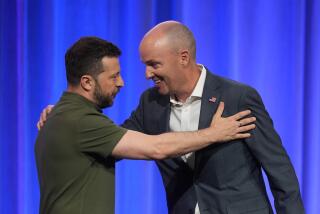Soviets Pledge Economic Aid for Nicaragua
- Share via
MOSCOW — Soviet leader Mikhail S. Gorbachev pledged solidarity and more economic aid to Nicaraguan President Daniel Ortega on Monday, and they both accused the United States of raising tensions in Central America.
The Soviet Union and Nicaragua signed a scientific, technological and economic agreement, said Tass, the government news agency, but it gave no details of what it provided. There was no mention of Soviet military aid for the Sandinistas.
Ortega arrived in Moscow for talks just a week after the U.S. Congress refused to approve President Reagan’s request for $14 million to help anti-Sandinista guerrillas in Nicaragua.
(In Washington on Monday, Reagan vowed to continue to seek aid for the Nicaraguan contras. He told European television reporters that the House was faced with a choice between allowing “another totalitarian Marxist-Leninist government like Cuba’s, now on the mainland of America,” or helping the people of Nicaragua achieve “the democracy they were willing to fight for, and that they did fight for, in overthrowing the Somoza dictatorship.”
(“They really are voting to have a totalitarian Marxist-Leninist government in the Americas, and there’s no way to disguise it,” he said of the House. “So we’re not going to give up.”
(Meanwhile, the U.S. Senate unanimously adopted a resolution Monday condemning Ortega’s trip to Moscow as “clear evidence of a continuing Sandinista effort to strengthen ties with the Soviet Union in support of Sandinista policies of militarization, repression and interference in the affairs of its neighbors.” The resolution, passed by voice vote, also charged the Nicaraguan regime with suppression of political opposition, the press and the church, and of engaging in a “massive military buildup.”)
Ortega, who first met Gorbachev when he attended the funeral of Soviet President Konstantin U. Chernenko in March, said before leaving Nicaragua that he will be seeking help “for the Nicaraguan people” in Moscow.
He was given a warm welcome here, with a front-page story and photograph in Pravda, the Communist Party newspaper. Tass spoke of him as one of the “Nicaraguan comrades” and said the talks took place “in an atmosphere of friendship and complete mutual understanding.”
Tass added, “The participants in the meeting strongly denounced the escalation of U.S. intervention in Central America and the expansion of U.S. military presence there, which poses a threat to the security of Latin American countries and turns that area into a dangerous seat of tension.”
U.S. ‘Incessant Hostility’
In the session with Gorbachev, Tass said, Ortega accused the United States of “incessant acts of hostility” and of interfering in Nicaragua’s internal affairs. However, he also said his government is ready for talks with the United States on the basis of equality to normalize bilateral relations, the official news agency said.
Both Nicaragua and the Soviet Union favor the peace efforts of the Contadora Group (Mexico, Panama, Colombia and Venezuela), the agency said.
“Mikhail Gorbachev stressed that the Soviet Union was resolutely coming out in defense of the inalienable right of the Nicaraguan people to free, democratic and independent development and was in solidarity with the struggle waged by Nicaragua against the aggressive intrigues of imperialism,” Tass reported.
The Soviet Union will continue to provide economic aid to Nicaragua as well as political and diplomatic support in its battle for sovereignty, the agency said.
Soviet Foreign Minister Andrei A. Gromyko; Geydar A. Aliyev, a member of the Politburo; Nikolai K. Baibakov, chairman of the state planning committee, and Boris N. Ponomarev, a candidate member of the Politburo, also sat in on the talks.
Besides Ortega, the Nicaraguan delegation included Foreign Minister Miguel D’Escoto; Henri Ruiz, minister of foreign economic cooperation; Jacinto Suarez, Nicaragua’s ambassador to Moscow, and Julio Lopez, head of the Sandinista National Liberation Front’s international department.
Ortega, who stopped off in Cuba at the start of his trip, plans to visit other Communist countries in Eastern Europe before returning to Managua.
More to Read
Sign up for Essential California
The most important California stories and recommendations in your inbox every morning.
You may occasionally receive promotional content from the Los Angeles Times.













